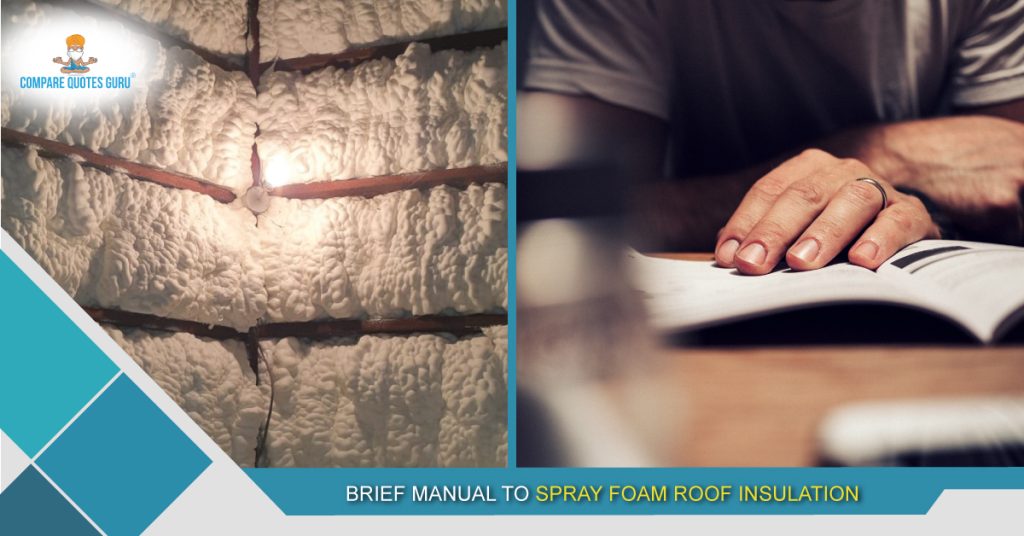Popular methods for improving homes’ energy efficiency include spray foam roof insulation. Spray foam insulation is so effective in reducing energy use that it has become a preferred insulation choice for many residents of the UK.
Making the decision to utilise foam insulation can lower your home’s energy costs while also enhancing its structural integrity, preventing leaks and moisture intrusion, and also prevents draughts. In fact, your property will be protected from dampness or seasonal variations and your loft space will stay dry, clean, and secure for storing items.
Before any work gets commenced for installing foam roof insulation, one of our partnered accredited contractor would check your property and perform a condensation risk analysis to ensure correct installation.
Here are some points that you should know about how to proceed if you are planning spray insulation on the roof of your house.
Spray Foam Insulation for Roofs
Much of the heat spent in warming our houses is lost through air leakage. So, preventing heat loss makes sense in order to increase energy efficiency and reduce energy bills.
Spray foam roof insulation fills in every nook and cranny and when sprayed it swells up to three times its liquid content. It is a fantastic technique to administer extra insulation and warmth to your property.
You don’t have to be concerned about moisture accumulating from inside the roof walls when you have the right spray foam roof insulation installed.
No mould formation will occur due to its tight shielding qualities as it averts vapour formation that inhibits moisture accumulation. This enhances your family’s well-being as well as the longevity of your house.
Which type of Foam Insulation should I use for the Roof?
open-cell spray foam is what we highly recommend. Spray foam with open cells has a spongy structure that makes it ideal for roof insulation. We choose open-cell for roof insulation because of its unmatched efficiency and benefits.
Spray foam roofing is an ingenious investment, and it rapidly pays off when you select the best insulation solution for insulating your roof.
Foam roof insulation has unmatched insulating qualities, in contrast to conventional roof insulation materials like fibreglass and insulation board:
• Improves the air quality
• Lesser possibility of burst pipes or ice dams because of the loft’s unique insulating ability
• As foam insulation expands to 100 times its original size after being sprayed, it fills every gap and creates a tight air barrier.
• You could save up to 50% on cooling and heating expenses.
• It won’t be used by pests as nesting space.
• Finding mice in your loft can be the worst scenario for anyone, but once spray roof insulation is fitted, you won’t have to worry about it anymore.
Many pollen spores and soil pollutants are present in the air and can readily pass through inadequate roof insulation. Your health and general well-being can be impacted by the air quality in your home even if you don’t have any allergies.
These allergen particles can be effectively blocked out by spray foam insulation uk cost for roofs. Imagine it as a shield on your roof that prevents allergens from sticking to it and spreading to other areas. This is beneficial all year long, not just during allergy season, as regular air pollution introduces several hazardous irritants.
Moreover, depending on the size and scope of the project, the cost to install roof insulation in the UK is expected to vary sometimes. When estimating the cost of adding roof insulation to a home, there are a lot of elements to take into account.
The kind of roofing you have and the materials used will usually affect how much it will cost to install roof insulation. The roof of your home can be insulated using a variety of techniques and materials.
How to Insulate a Roof Using Spray Foam?
Due to the technical challenges of installation and the associated health and safety concerns, spray foam insulation is highly discouraged for do-it-yourself installations. You should have a survey done to make sure your home is acceptable before choosing spray foam insulation. If so, you can choose between closed-cell and open-cell spray foam.
Closed-cell will entirely seal off your roof area and block moisture; therefore your loft will need to be aired to prevent the build-up of condensation. Open-cell insulation, on the other hand, enables moisture to pass through it thereby rendering your roof breathable. Spray foam is applied to your roof using specialised equipment, providing a uniform covering.
Conclusion
It’s obvious that spray foam roof insulation is one of the finest ways to keep your home secure and pleasant for many years based on the advantages listed above. There are fewer health concerns, longer lifespans, better energy and money-saving solutions, increased comfort, and durability.
Only professionals from accredited companies with the necessary knowledge should properly handle spray foam roof insulation. It’s crucial to remember that while it costs more than other roof installations, the expert application requires training and expertise. You can always depend on partnered national contractors of Compare Quotes Guru in finding easy and effective insulation solutions.

